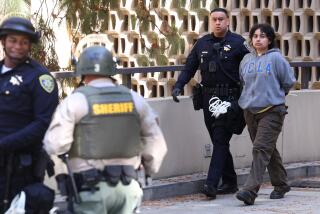Pangs of Democracy
Westerners who hope that economic reform in China will ultimately produce democratization of the political system are likely to have mixed feeling about the outbreak of university student demonstrations in recent weeks. There is an instinctive sympathy toward impatient students who demand instant “democracy” and urge the Communist leadership to remember what happened to dictator Ferdinand E. Marcos of the Philippines. But this sympathy is accompanied by concern that the students may be playing into the hands of the hard-liners in Peking who think that the Westernization of China has gone too far already.
Chinese society has undergone a remarkable degree of change since Deng Xiaoping’s emergence as the leader of the Communist regime. Many thousands of students have been allowed to study abroad. The regime tolerates the publication of a wide range of views, including some at variance with the official views of the Communist leadership. Just this month the regime unveiled a new policy under which there will be more than one candidate for each seat in municipal elections --although the nominees still must be approved by party authorities.
Deng himself has said that economic reform, with its de-emphasis of centralized control, will eventually require a greater liberalization of the political system. But he is talking in terms of change over a period of many years--and, in any event, has never suggested any surrender of the Communist Party’s monopoly of power.
For many university students, this obviously isn’t good enough. During the past four weeks, student demonstrations demanding “democracy” and “freedom” have occurred in Shanghai, Peking and several other Chinese cities.
Although wall posters and banners have in some cases demanded multiparty rule, it is unlikely that most of the demonstrators really want to abandon the socialist orientation of the Chinese economy and society. However, they do clearly want free speech, plus the right to make their own career choices, to live where they choose and to elect their own representatives to local governing bodies.
The Communist authorities, while seeking to curtail the demonstrations, have acted with impressive restraint. As far as foreign observers can detect, there has been no head-bashing by police and few if any arrests of demonstrators.
In recent days, however, the government has shown growing alarm. Demonstrators have been threatened with jail if they advance “counter-revolutionary” slogans. Party organs are filled with stories on the failings of Western democracy and describing the protests as a potentially destabilizing factor that could threaten China’s economic development. But still the demonstrations go on.
The danger is that the protests, far from producing major concessions to democracy, will slow the process of liberalization that has been under way. Already tradition-minded conservatives in the party are trying to blame the demonstrations on excessive Westernization.
The students might do well to heed the call for restraint from a professor known for his progressive views. In his words, “Our means of expressing criticism should be in the interests of stability and unity. Otherwise, good things will turn bad.”
More to Read
Sign up for Essential California
The most important California stories and recommendations in your inbox every morning.
You may occasionally receive promotional content from the Los Angeles Times.










